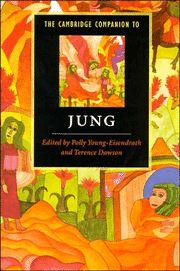Book contents
- Frontmatter
- Introduction
- Part 1 Jung's ideas and their context
- Part 2 Analytical psychology in practice
- Part 3 Analytical psychology in society
- 11 Gender and contrasexuality
- 12 A Jungian analysis of Homer's Odysseus
- 13 Jung, literature, and literary criticism
- 14 Jung and politics
- 15 Jung and religion
- Glossary
- Index
- References
12 - A Jungian analysis of Homer's Odysseus
from Part 3 - Analytical psychology in society
Published online by Cambridge University Press: 28 May 2006
- Frontmatter
- Introduction
- Part 1 Jung's ideas and their context
- Part 2 Analytical psychology in practice
- Part 3 Analytical psychology in society
- 11 Gender and contrasexuality
- 12 A Jungian analysis of Homer's Odysseus
- 13 Jung, literature, and literary criticism
- 14 Jung and politics
- 15 Jung and religion
- Glossary
- Index
- References
Summary
We often employ symbolic thinking in our quest to represent some of the mystery and power that we feel in the world around us. Such symbolmaking can be unconscious as well as conscious, and finds especially congenial vehicles for its expression and artistic elaboration in dreams, myths, and storytelling. Hence it is no surprise that literature in general, and in particular those literary genres that are closest to the fantasy structures of myths and dreams - i.e. folktale and epic - yield themselves easily and successfully to symbolic readings.
Psychology and anthropology (with its offshoot in folklore) are the two disciplines that have most systematically offered us both theories and methodologies for making sense of the elaborate symbol systems that individuals and societies employ for their visions of what is most vital in life. I hope to demonstrate how the archetypal theory of Jungian psychology, supported with insights derived from folklore and anthropology, can illuminate a significant aspect of one of the cornerstones of the Western literary tradition, Homer's Odyssey.
Much of the distinctive complexity of this epic poem is generated by the moral ambiguity of its hero Odysseus, commonly acknowledged by critics but never fully explained. I believe that this quality in the hero strikes us and disturbs us deeply because it draws its energy from a major universal archetype, that of the Trickster.
- Type
- Chapter
- Information
- The Cambridge Companion to Jung , pp. 240 - 254Publisher: Cambridge University PressPrint publication year: 1997
References
- 3
- Cited by

